‘Leads’ are potential customers that have to be encouraged to make the final purchase.
However, not every lead that you capture will end up converting into a customer.
In this situation, engaging with every lead in the same way just doesn’t make sense.
With limited sales representatives and resources available, you need to allocate them judiciously. Devoting the same amount of time and resources to both qualified and unqualified leads is a recipe for disaster.
With the effective lead qualification, your sales reps can focus on high-value prospects and bring in more revenue.
Fundamentally, lead qualification is meant to help businesses save time and money by focusing only on important prospects and making their interactions more personalized and appropriate.
However, to qualify leads effectively, you need a standardized process that involves tracking the most important metrics. Additionally, you require dedicated lead qualification tools to score your leads.
There are several other things to keep in mind when qualifying a lead-
What makes a qualified lead?
Which questions to ask?
Which characteristics to track?
How to assign a lead score?
In this blog, we answer the most important questions related to lead qualification. We cover the definition, importance, steps, various frameworks, types of qualified leads, and ways to enhance lead qualification for your business. We also shed light on the role an effective CRM tool can play in lead qualification.
This detailed guide is meant to help you understand the basics of the process and implement it effectively.
Let’s get down to the nitty-gritty of lead qualification without further ado!
What is Lead Qualification?
Before we get into the intricacies, let us begin by providing a simple lead qualification definition:
Lead qualification refers to the process of identifying how likely the prospect is to make the final purchase.
It essentially involves sorting through the leads to find the best prospects that can be nurtured for conversion.
While you may have several incoming leads, only a handful of these is likely to convert after passing through the sales funnel.
Therefore, it is critical to qualify sales leads to focus on those with a higher chance of a conversion.
Lead qualification involves assessing the leads and comparing them against your ideal customer profiles to determine if they would be a good fit for your business.
Sales qualified lead definition involves the following characteristics:
- Potential to make the purchase
- Profile that matches your buyer’s persona
- Budget compatibility
- Ability to clearly express their needs and challenges
- Interest in your business
On the other hand, leads that are unresponsive or inconsistent with their answers fall under the unqualified category. Other reasons that may make a lead unqualified are:
- Not having the purchase as their current priority
- Not having the budget to make the purchase
- Not having a clear understanding of their challenges and how the product can help overcome them
How Lead Qualification Works?
Leads are acquired from various channels, including quizzes, surveys, live chat, cold calls, emails, social media platforms, offline events, etc.
Marketing teams capture these leads and their associated information, such as contact details, online activity, etc., to determine if they would be interested in the product or service.
Following this, the lead is contacted for more details, including their budget, buying authority, specific needs, challenges, etc. Other information such as the lead’s click-through rate, website visits, social media interactions, etc., are also tracked to understand their interest in the product/service.
All of this information is then utilized to qualify the leads.
The leads are given a score based on various factors that determine how likely they are to make the purchase.
If the lead is deemed qualified to be a prospective customer, the sales representatives have to draft a proposal that meets the lead’s requirements and work on closing the deal. This involves actively engaging with the prospect and helping them better understand the product and how it can meet their needs.
Leads that are not ready to make the purchase are nurtured using various marketing techniques.
What Makes Lead Qualification Crucial?
All businesses look for avenues to get more leads.
However, getting more leads than your sales representatives can handle can be a huge challenge.
This scenario presents the importance of establishing a system that allows sales reps to focus only on qualified prospects.
While many businesses fear disqualification and wish to retain as many leads as possible, working on leads that are not going to make a purchase will only end up being a waste of time and resources.
Scoring and prioritizing leads offers several advantages, including:
Save Time & Resources:
Sales lead qualification can save you from wasting time and effort on low-quality leads. By ascertaining if the prospect is worth the efforts right at the start, you can ensure that your time and resources are utilized optimally. Wasting more hours on unqualified leads is unproductive and results in missed opportunities. Therefore, it is crucial to qualify leads and prioritize them accordingly.
Provides More Visibility:
Qualification of sales leads gives you more visibility into available sales opportunities. With a clear picture of all prospects and their likelihood of making the purchase, you can work on high-quality leads that require immediate attention. This ensures that profitable opportunities are not lost to competitors because of unresponsiveness from your team.
Improves Bottom Line:
Enhanced productivity, better quality leads, and more efficient utilization of time and resources result in improved ROI. With proper scoring and management of leads, you can expect to see a considerable impact on your business’s bottom line. When you only work with well-qualified prospects, the chances of conversions drastically increase. This leads to an improved sales outcome and helps you improve your bottom line.
Helps Sales Reps Meet Targets:
The performance of sales representatives can be significantly improved with an effective lead qualification process. With all kinds of leads thrown at sales executives, the entire process can be overwhelming and inefficient. While failure is inevitable when working as a sales executive, not having access to qualified sales leads only worsens the situation. When sales representatives get access to well-qualified leads, they can work on optimizing their selling pitches and convert more leads into sales.
While lead qualification does not warranty more conversions on its own, it does open up opportunities for focusing on the right prospects. When coupled with an efficient sales process, lead qualification can generate great financial returns for any business.
Benefits of a Lead Scoring Process
A well-established sales process can contribute to increased profitability.
An essential part of this process is lead qualification.
67% of sales opportunities are lost due to lack of proper qualification.
In the absence of lead qualification, your team will end up devoting equal time and resources to all kinds of leads. While some of these will convert into profitable customers, many of these leads will fall through the cracks, ending up being a waste of time for your business.
Therefore, you must invest in a lead qualification system to prioritize leads that carry better value for your business.
With a well-drafted lead qualification framework, you can accomplish:
Better Productivity:
A consistent leads qualification framework can enhance productivity for your sales team. With lesser time wasted on cold leads, sales representatives can improve their closing rate.
Lead qualification ensures that productive hours are not spent chasing after leads that do not have any real intention of making the purchase.
This helps sales representatives see better outcomes from their selling efforts since they are pursuing leads that have a real chance of converting.
Additionally, an automated sales process can contribute to more efficiency and help you keep things moving at all times.
More Personalization:
Personalized interactions improve the chances of conversion of the prospect into long-term customers.
Along with saving time, a lead qualification process can also boost your personalization efforts. With access to important information, including pain points, needs, goals, etc., your sales reps can optimize their selling pitches and make them more effective.
Keep Marketing & Sales Aligned:
Lead qualification is critical for both sales and marketing. Both teams have to stay on the same page regarding what qualifies as a good lead. This alignment is essential for the marketing teams to capture more relevant leads that can be passed to the sales team for conversion.
With a consistent lead scoring process, both sales and marketing teams can work together to identify qualified leads and generate more revenue.
Lead Qualification Methodologies
With all the discussion about the significance of lead qualification, it’s important to address a pertinent question here-
How to qualify a sales lead?
The characteristics of leads that carry the most value usually differ for various businesses.
For qualifying leads for sales, you need to decide which characteristics are the most important for your enterprise and seek necessary details from the leads accordingly.
Some of the commonly used frameworks that are used to qualify leads are:
BANT (Budget, Authority, Needs,Time):
One of the oldest and most commonly used lead qualification frameworks is BANT. In this methodology, the budget, purchasing authority, needs, and timeline are taken into account when qualifying the prospect. The budget is given the highest priority in the qualification process. BANT involves questions like-
Do they have the budget for your product or service?
Do they have a say in making the final decision?
Do they have specific problems that your business can solve?
A lead has to meet at least three of the above-mentioned criteria to qualify. Being a straightforward methodology, BANT works well for businesses beginning with lead qualification.
CHAMP (Challenges, Authority, Money, Prioritization):
CHAMP methodology involves paying attention to the types of challenges that the lead faces. Other factors that are considered in this framework are:
The authority to make the final decision
The budget of the lead
The priorities and how your product or service can fit into the prospect’s business model
ANUM (Authority, Needs, Urgency, Money):
ANUM involves determining the authority of the lead in the decision-making process. It assesses the lead against your ideal customer profile and aims to find out if you are dealing with the decision-maker in the organization. Other details that are considered for ANUM are:
The requirements of the lead
The urgency or timeline that they are looking for
The budgetary requirements of the prospect
GPCTBA/C&I (Goals, Plans, Challenges, Timeline, Budget, Authority):
This methodology involves going into more detail about the goals and objectives of the prospect. This lead qualification framework enables sales executives to take a closer look at the plans and challenges faced by the lead and offer reliable solutions accordingly. The framework looks for answers to the following questions:What are the goals behind making the purchase decision?
Do they have an implementation plan to achieve the said goals?
What are the challenges they currently face, and how can your product/service help overcome them?
What is the expected timeline for achieving these goals?
What is the authority of the lead in the decision-making process?
FAINT (Funds, Authority, Interest, Needs, Time):
Just like BANT, FAINT also considers budget to be the most important qualifying factor. This is followed by the purchasing authority. Additionally, the FAINT methodology takes into account the following-How interested is the lead in making the purchase?
What are the lead’s requirements and expected timeline?
Lead Qualification Questions
While these were some of the commonly employed qualification frameworks, there may be other questions that are more relevant according to your business requirements.
Since you have to get the most information from the leads without bombarding them with countless questions, you have to be smart with the choice of questions.
When considering how to qualify leads, choose questions that help you get all the essential details you require without being too interrogative.
These questions can look like this:
- How will the product fit into your existing system?
- What does the future look like for your business after the implementation of this product?
- Who are the people that would be authorizing the purchase?
- What is the most important feature that you are looking for in possible solutions to your problem?
- What are the most significant challenges that you are expecting to solve with this product?
- Are you currently working on any solution for the said problem? If yes, what makes you consider other options?
These are some of the questions that you can include in your qualification process.
No matter which questions you choose to go with, the fundamental one is-
Would they be a good use of your time and resources?
Types of Qualified Leads
Leads can be qualified at multiple stages of the sales process.
Based on the position of the leads and the extent of understanding they have about the business, they can fall under any of the following categories:
IQLs- Information Qualified Leads:
Information Qualified Leads are prospects seeking possible solutions to their problems. These leads have provided their details in exchange for information about your business. At this stage, the leads have a minimal idea about your business. They are only researching possible solutions.
MQLs- Marketing Qualified Leads:
A marketing-qualified lead refers to a prospect that has shown interest in your business and has interacted with the marketing team.
IQLs that have taken some action, such as attending a webinar or watching a video, can be termed as marketing qualified. These leads have a better idea about their own challenges and your business. However, these leads haven’t entered the sales cycle yet.
SRLs- Sales-Ready Leads:
Sales Ready Leads are interested enough in your product to learn more about it and have requested to engage with a sales representative.
While these leads are not ready to make the purchase yet, they have expressed interest in the product. Sales teams can qualify these leads based on various factors.
SQLs- Sales Qualified Leads:
Leads that have been qualified as prospects by the sales team fall under this category. Sales representatives have to identify and nurture SQLs to convert them into customers. These leads require timely follow-ups to be encouraged to make the final purchase decision.
The leads that do not qualify are termed unqualified leads and are dropped from the sales process.
Qualifying Sales Leads
To qualify a lead effectively, you need to seek relevant information and utilize it to make the final call.
Lead qualification checklist of information that you essentially need includes:
Buyer’s profile:
To qualify leads, you need to assess their profile and compare it against your buyer’s persona. Find out if the lead meets your requirements in various regards, including budget, authority, need, etc.
Company Details:
You also need to consider the company’s information when qualifying lead for your business. Find out what challenges they face and how you can address them.
Online activity:
Tracking the online activity of the leads, including the time spent on your website, social media activity, the material viewed or downloaded, etc., can help you qualify leads more effectively.
Detecting Bots:
Spam detection can help you stay clear of bots and devote your time and resources to real prospects.
4 Steps to Enhance Lead Qualification
Lead qualification, if done correctly, can be one of the most profitable things for your business.
Less time wasted on low-value prospects inevitably translates into more productivity and higher revenue.
To help your sales grow, you need to find and qualify leads.
Now that we have already listed various ways of qualifying leads, we come to effective implementation of the qualification process.
To get the most out of lead qualification, you need to fine-tune your qualification strategy and adapt it according to your business needs.
A well-optimized lead qualification process can make the selling process slightly easier for your sales representatives since they won’t have to worry about the credibility of the lead that they are working on.
Here are the 4 most effective ways to improve your qualification process:
1. Define Lead Qualification Characteristics
The first step of the process is to clearly define what makes a “good lead” for your business.
Your sales and marketing teams have to agree upon a single definition of a lead. This compatibility can help you find the most relevant characteristics to track when qualifying leads. Lack of collaboration between sales and marketing can result in wasted time on MQLs that carry little to no value for the sales team.
Once you have established the lead definition, you need to move to the next aspect- determining which information to seek.
Asking the right and the most relevant questions is critical for the success of your lead qualification process.
You have to acquire the required knowledge without being overbearing. This requires you to choose the right set of lead qualification characteristics.
We have already covered various lead qualification methodologies you can opt from when qualifying leads. Whichever characteristics you choose, make sure they are the most appropriate and relevant to your business. Asking the right questions initially will provide you with better insights into the interest and purchasing intent of the lead.
2. Automate Process
80% of businesses using marketing automation witnessed an increase in their leads, and 77% saw more conversions.
You can fast-track your lead qualification and nurturing with automation.
A significant portion of sales reps’ time includes administrative tasks like data entry, drafting emails, managing customer data, etc.
When you automate these time-consuming tasks, sales representatives can focus more on selling and forming relationships with the clients.
Using a CRM tool for lead qualification can provide you with several automation capabilities that aid the qualification process. It can automatically capture lead information, so you do not have to spend time looking for this information. For instance, some CRM tools enable you to track the social media activity of contacts, which can be used to enrich contact profiles and improve qualifications.
Additionally, you can automate email campaigns to nurture leads and get more conversions.
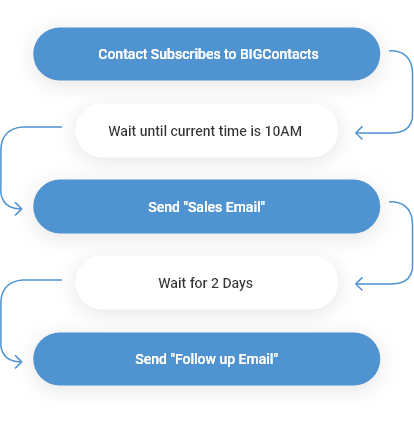
3. Continuously Review Your Process
You need to strive to improve your lead qualification process continuously.
Gather insights from your existing process to find areas of improvement and modify your qualification strategy accordingly.
Track important metrics, such as the conversion rate and the time frame for converted leads to find out how you can improve your scoring process.
Continuously improve your qualification process by comparing your best customers with the types of leads you are qualifying.
It is important to review your lead scoring process routinely since the definition of what makes a good lead for your business is not static.
With business objectives, customer expectations, and competitors evolving continuously, your lead scoring criteria need to change as well.
What qualifies as a good lead now may not be a suitable fit for your business in the future.
Therefore, you must regularly analyze and optimize the process by keeping track of the outcomes of your lead qualification.
4. Use the Right Technology
Finding the right lead tracker and qualification tool can help you manage and qualify your leads optimally.
As evident from the points mentioned above, the lead qualification software that you choose should offer functionalities such as automation, reporting, analytics, and communication tracking.
With the assistance of the right technology, you can expect much better results from your lead qualification process. Go for a tool that captures data automatically and helps you establish a consistent workflow for lead scoring. Such a tool can help you view which prospects should be actively pursued by sales executives and which leads are better off left out of the sales cycle.
To find the best tool for lead qualification:
-
- Keep your specific requirements in mind.
- Make sure to compare multiple products.
- Test the functionality of the tool by opting for free trials.
Lead Qualification With CRM
When determining the authority and credibility of leads, you need access to relevant information related to them.
Additionally, this data has to be readily available and accessible to all team members.
Tracking a handful of leads and their associated information is easy.
However, when you have several prospects to qualify and manage, you require the right technology to ensure that no lead is missed out.
CRM systems not only help in lead generation but also aid qualification by acting as a data repository and a productivity tool. Using CRM software for lead nurturing and qualification can maximize your sales and marketing performance.
It can provide you with the following functionalities to nurture your leads and enhance lead qualification for your business:
All Information in One Place:
With CRM, all the contact details, previous interactions, and specific requirements are stored in one place. Detailed contact profiles improve lead qualification since all the details that are required to make the decision are readily available.
Complete visibility of the leads’ contact information, buying authority, budget, timeframe, etc., can help you qualify and prioritize them efficiently.
Manage Emails:
CRM allows you to track, schedule, and manage all your emails easily. You can use this functionality to capture more relevant leads and qualify them effectively based on their responsiveness.
Using an efficient CRM tool, you can track various metrics, such as the open or click-through rates for your email campaigns.
Prioritize Prospects:
With enhanced visibility and insights, CRM can help you prioritize customers more efficiently. You can track the lead score and current position of all available leads to find out which lead has the highest potential of converting into a customer.
This prioritization ensures that important leads do not get missed out on and there are no unnecessary delays in response time. Timely follow-ups with prospects help avoid frustration and prevent leads from switching to competitors.
Share Data:
CRM aids internal collaboration to improve your lead qualification.
You can easily share data and updates across the organization to keep everyone on the same page.
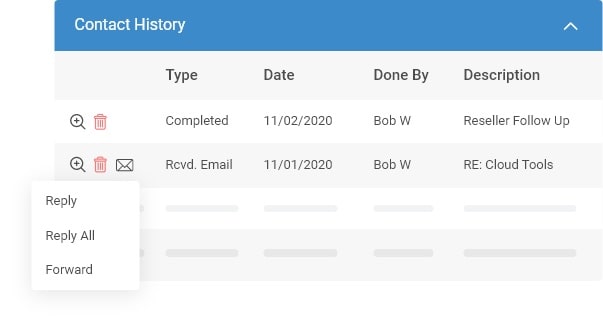
The sales and marketing divisions can communicate seamlessly. This ensures that marketing teams do not waste their time on leads that the sales team would reject. Alignment between sales and marketing can boost productivity and bring in more profits.
Move Deals Along:
Managing sales leads becomes considerably easier with CRM. You can easily view where the lead currently is and keep them moving forward in your sales pipeline.
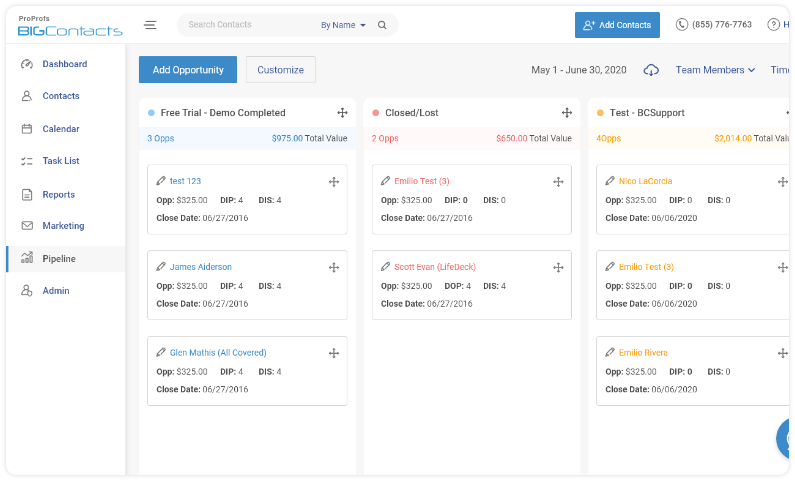
Along with helping move qualified leads along to the right sales representative, CRM can allow you to track the current position of every lead to ensure that no opportunity goes unnoticed.
Automate Workflow:
A CRM with automation capabilities can be a valuable addition to your lead scoring and management.
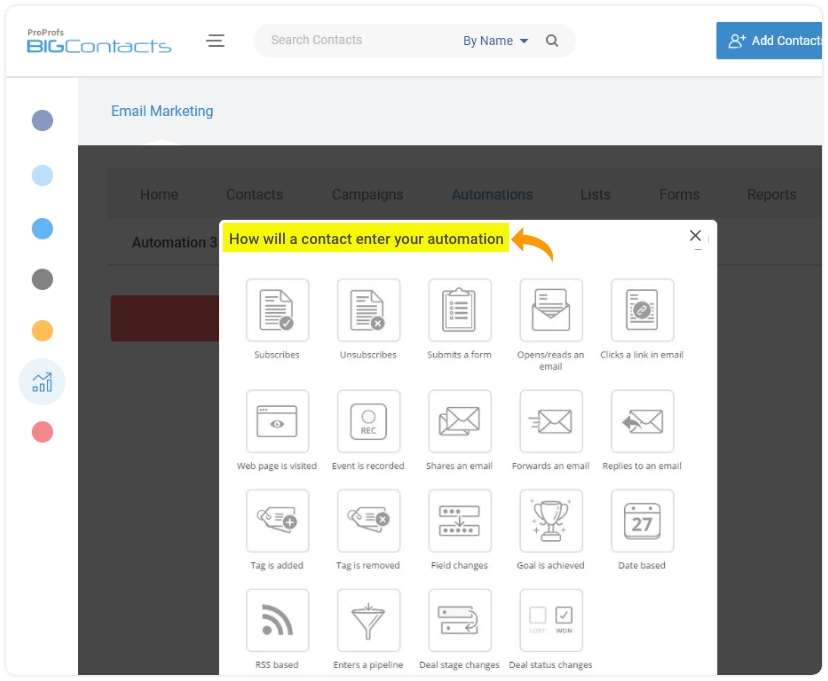
It can capture data automatically, helping save time and effort for your team. Additionally, your sales team can focus on the high-priority deals while the CRM automates marketing activities for slightly warm leads that require nurturing before they are willing to make the final decision.
Track Performance:
You can track how well your lead qualification efforts are working with CRM reporting and analytics.
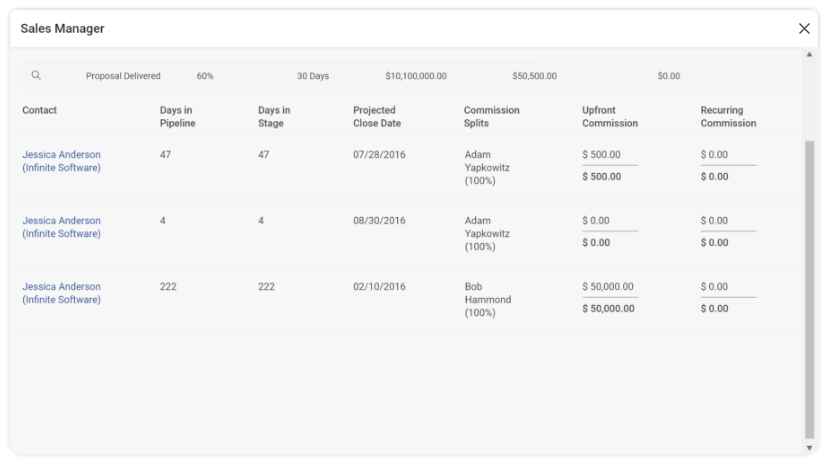
Monitor how many qualified leads actually convert into sales. Identify what caused qualified leads to drop out of the sales funnel and if there are some gaps in your qualification process.
Improve Your Closing Rate With Lead Qualification!
A standardized method of forecasting lead outcomes can help your team focus on qualified prospects and close more deals.
While this sounds uncomplicated, there’s a lot of information to track when qualifying leads.
To ensure that this information remains organized and accessible, you need an effective lead qualification system.
Additionally, you need to establish a custom lead qualification process that meets the specific requirements of your business.
Therefore, you need to find the right lead qualification tool that allows you to automate repetitive marketing activities and keep customer information organized for better qualification.
A powerful CRM tool like BIGContacts can help accomplish this easily. You can use it to automate repetitive tasks, keep data accessible and measure the performance of your sales and marketing efforts.
FREE. All Features. FOREVER!
Try our Forever FREE account with all premium features!







